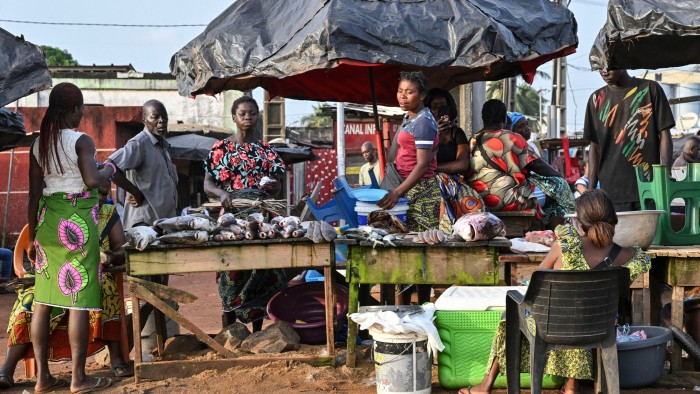Stay informed with free updates
Simply sign up to the Sovereign bonds myFT Digest — delivered directly to your inbox.
The World Bank will underwrite a loan for Ivory Coast to replace costly bonds less than a year after the world’s biggest cocoa producer paid high rates to tap markets, as African countries struggle to escape expensive debt burdens.
The west African nation will use cheap financing to buy back close to €400mn in bonds that will be up for repayment over the next few years and put the savings into public spending in the first such “swap” backed by the World Bank, the institution said on Thursday.
“Debt for development” or “debt for nature” swaps — where savings are ploughed into environmental conservation — have swept markets for the bonds of the world’s poorest countries this year, as states are turning to financial engineering to contain a surge in borrowing costs without taking on more debt from official lenders.
Commercial banks or development institutions typically offer loans at cheaper rates than the bonds being bought back, in return for promises by the countries to fund conservation efforts or to protect social spending. The cheap rates are often made possible by guarantees from international development agencies.
The World Bank’s guarantee on the loan to Ivory Coast will help it save €60mn in debt service costs that can be spent on education.
Ivory Coast was the first sub-Saharan African state to sell a US dollar bond in almost two years in January when it paid more than 8 per cent in borrowing costs to sell $2.6bn in debt.
While the bond market has reopened to other African borrowers, most recently Nigeria, the high rates they are paying relative to US Treasuries have made many countries think twice about the sustainability of this borrowing.
“You tend to see swaps when you have no alternatives, because of the costs of doing a swap,” said Daniel Munevar, economic affairs officer at UN Trade and Development.
Kenya paid double-digit rates to issue US dollar bonds this year instead of taking up an offer of a debt for nature swap, he said.
Swaps backed by development banks had looked more attractive, Munevar said, providing low-cost long-term financing to countries while trimming their debt burdens. “If you create these structures so the country gets to decide what to do with the freed-up resources, that’s a very positive thing,” he said.
While such deals have attracted governments struggling under heavy debt burdens, some experts point out that they can be costly — including for the World Bank, which could instead allocate its capital directly to projects.
“When you do these buybacks, financed by preferred or guaranteed borrowing, most of the money is going to the buyback, and the country only benefits from the freed-up debt service,” said Brad Setser, senior fellow at the Council on Foreign Relations.
“There’s an argument that it is more efficient just to take out a loan,” but countries are trying to avoid adding to their debt stock, Setser added.
This week Ecuador launched a $1bn bond buyback via a special purpose vehicle tied to Amazon conservation efforts, in a deal arranged by Bank of America. Last year the country also used a $1.6bn swap to retire debt in return for spending on the Galápagos Islands.
Ecuador’s deals and others like it have been criticised over complexity and costs such as those for setting up the offshore special purpose vehicles often used to manage buybacks. Bank of America declined to comment.
“Unlike other swaps that use costly structures, including offshore special-purpose vehicles and trust funds that often incur significant transaction, administrative, and financial costs, this operation uses country systems already in place,” the World Bank said of the Ivory Coast deal.
Many development-focused debt swaps have been backed by groups of institutional investors, such as a “blue” marine conservation bond issued by Gabon, the west African oil producer, in 2023. Others are deals made by a single bank, such as a $1bn loan by JPMorgan to El Salvador in October that was linked to river conservation.
The US government has also backed several of these deals through insurance provided by the Development Finance Corporation, an agency that is competing with China’s policy banks to provide finance to poor countries.
Read the full article here

